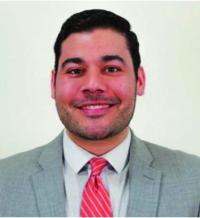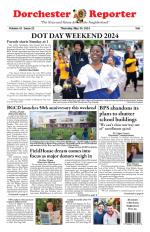August 12, 2021

More than three decades after Massachusetts banned bars and restaurants from offering happy hour drink promotions, a Dorchester attorney wants voters to decide if the practice should return to the Bay State.
Nick Silveira launched an effort on Aug. 4 to make the fate of happy hour a question on the 2022 ballot, filing an initiative petition that would effectively reverse the long-standing ban on discounted and promotional alcoholic drinks aimed at attracting customers from the after-work crowd or at less popular times of day.
In an interview, Silveira said he believes the state is “long overdue” to reconsider the 1984 ban. Ride-hailing apps have become nearly ubiquitous, which Silveira said could reduce the risks of drunk driving from bars and restaurants facing major financial strain amid the pandemic.
“I think government should police us in the least restrictive way possible, and I think you can only legislate behavior so far before it becomes onerous on those who are behaving,” he said. “Public sentiment and public discouragement and punishment surrounding drunk driving in particular, which led to the ban in the first place, has swung. I think people have more negative opinions of those who drive drunk, and on top of ride-sharing services in particular, I think it’s the perfect storm for us to revisit this.”
The potential ballot question, which would need to clear several additional hurdles before it could go before voters, would explicitly authorize eight different kinds of promotional practices at bars or restaurants who hold alcohol licenses. Those would include offering free drinks, delivering more than two drinks to a single person at one time, and hosting “games or contests which involve drinking or the awarding of drinks as prizes.”
The Alcoholic Beverages Control Commission would have authority to regulate happy hours within the bounds of what the question allows.
Silveira said the proposal is “for all intents and purposes” a repeal of the state’s ban on happy hours, implemented in 1984 after a series of deadly motor vehicle crashes involving drivers who were under the influence of alcohol.
While Silveira said he can “empathize” with the intent of the original prohibition, he argued that public behavior and access to safe transportation have changed substantially in the ensuing 37 years.
“Another thing that spurred my interest was the drastic toll that the virus obviously had on the restaurant and bar industry,” Silveira said. “I think it’s a perfect time to take the leash off them a little bit and give them the opportunity to create their own success.”
A MassINC Polling Group poll released last month found that 70 percent of Massachusetts residents would support bringing back happy hour, a significant majority that shifted the idea back into the spotlight.
Beacon Hill has rejected previous efforts to revive happy hour, including in 2011 as part of the casino bill.
Gov. Baker said in the wake of the MassINC poll that he remains a “skeptic of going back to the way we ran happy hours,” while House Speaker Ronald Mariano said he is open to discussing the idea but stopped short of supporting or opposing it.
“There has to be a balance between what aid you give to bars and restaurants and the public safety issue that is a real concern for many people, but it is worth giving it thought,” Mariano told Bloomberg Radio in a July 22 interview.
So far, Silveira is operating on his own as an individual voter interested in changing state policy and is not working with an organization.
Major industry groups such as the Massachusetts Restaurant Association have yet to take a stance on the ballot question. Their decision could prove significant, particularly if they pitch in to help with the collection of two rounds of signatures necessary to advance the question to the ballot.
Silveira said he has reached out to industry groups and is awaiting a firm response, but he said anecdotally that several restaurants and bars have voiced “pretty tangible” support so far in one-on-one discussions.
“I think I would be foolhardy to think that I could do it on my own,” he said.
If an initiative petition clears Attorney General Maura Healey’s constitutional review, its sponsors would need to gather 80,239 voter signatures and submit them with local elections officials by Nov. 17.
In a brief statement on Aug. 6, Massachusetts Restaurant Association President Bob Luz said the group plans to discuss the proposal at its next board meeting.
“We are a long way away from any potential ballot questions coming before the voters, so I think it would be premature to say anything else right now,” Luz said.
Mothers Against Drunk Driving, an advocacy group that supported the 1984 ban, last week did not say whether it would support or oppose the potential ballot question. Bob Garguilo, MADD’s New England Region Executive Director, said in a statement that the organization “does not take a position on the sales of alcohol to people who are 21 and older.”
“We encourage everyone whose plans include alcohol to always plan ahead for a non-drinking, unimpaired driver to get them home safely — rideshare, taxi, public transportation or a non-drinking friend or family member,” Garguilo said. “We will monitor the proposal to lift the happy hour ban and expect to be part of the discussion if it moves forward.”
Rep. Mike Connolly also wants lawmakers to take a closer look at the issue, and he plans to include language in a forthcoming restaurant relief bill (HD 3896) that will bring together affected parties to discuss easing the ban.
Connolly, a Cambridge Democrat, stopped short of supporting the ballot question, but said he believes state government should launch a “real, full vetting of all the concerns and perspectives.”
With the advent of ride-hailing services like Uber and Lyft offering new ways home from restaurants and bars, Connolly said “the landscape has really changed.”
“I don’t necessarily see us going back to exactly what happy hour looked like back in the year 1984,” Connolly told the News Service. “At the same time, I have to imagine there’s a wide range of possibilities in between a total prohibition on the one hand and a total free-for-all on the other hand. The thought here really is: could we create the framework to have that sort of public dialogue? Can we find consensus around a set of provisions that would in a very constructive way help support restaurants and bars?”




